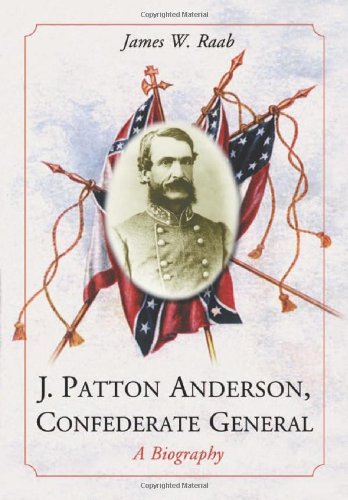
J. Patton Anderson, Confederate General
by James W. Raab
"A Biography"
Popularity
2.46 / 5
* A book's popularity is determined by how it compares to all other books on this website.
Where to buy?
Buy from Amazon* If you buy this book through the link above, we may receive a small commission at no extra cost to you.
J. Patton Anderson, Confederate General by James W. Raab
Details
War:
American Civil War
Perspective:
Commanders
True Story:
Yes
Biography:
Yes
Region:
North America
Page Count:
213
Published Date:
2004
ISBN13:
9780786417667
Description
Brief Summary (no spoilers)
"J. Patton Anderson, Confederate General" by James W. Raab is an expansive biography that delves into the life and military career of J. Patton Anderson, a prominent figure in the Confederate States during the American Civil War. The book paints a comprehensive portrait of Anderson's journey from a plantation owner in Florida to a Major General in the Confederate Army. Raab meticulously details Anderson's involvement in the Mexican War, his role as United States Marshal in Washington Territory, and his impactful service throughout the Civil War, particularly in the Western theater. The narrative is enriched by personal correspondence between Anderson and his wife, Etta, offering an intimate glimpse into their lives and the challenges they faced during tumultuous times.
Main Themes and Topics
One of the central themes in "J. Patton Anderson, Confederate General" is leadership and duty. The book explores Anderson's leadership qualities and his sense of duty not only on the battlefield but also in his personal life as he managed familial responsibilities amidst war. Raab also examines the theme of loyalty, both to the Confederate cause and to family, often reflecting on the personal sacrifices that come with such commitments. Additionally, the biography provides insights into the socio-political climate of the time, especially the dynamics of the Southern states' secession and the Civil War's impact on individual lives.
Writing Style and Tone
James W. Raab employs a detailed and methodical writing style that brings historical events and figures to life. His tone is informative and engaging, drawing readers into the world of the mid-19th century Southern United States. By integrating personal letters between Anderson and his wife, Raab's narrative gains a poignant, human touch that adds depth to the historical context. The author's attention to detail and commitment to factual accuracy make this biography both educational and compelling.
Criticism
While Raab's meticulous approach to chronicling Anderson's life is commendable, some readers may find the extensive focus on military tactics and battles somewhat overwhelming if they are looking for a broader historical overview. The book's heavy reliance on military history might not cater to those looking for in-depth analysis of the socio-political implications beyond the battlefield. Additionally, some critics point out that the biography occasionally glosses over the broader, systemic issues of the Confederate cause that might have complemented the personal narrative of Anderson's experiences.






![From Manassas To Appomattox : Memoirs Of The Civil War In America [Illustrated Edition]](https://m.media-amazon.com/images/I/514z0GOB0GL._SL500_.jpg)


